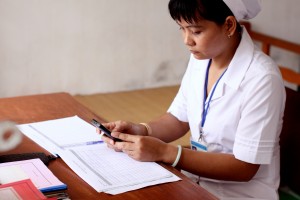How a paperless immunization system is empowering frontline health workers in Vietnam

By Nguyen Tuyet Nga, PATH, Vietnam Program Team Leader
NOTE: This blog was submitted in partnership with Frontline Health Workers Coalition member GlaxoSmithKline (GSK).
Imagine spending two days compiling lists of children due for vaccination from records kept in paper ledgers, and then writing invitations to be hand-delivered to these children’s homes. After transcribing 100 children’s names, let alone 500, it would be entirely forgivable to misspell a name, or forget to make a note of all three vaccines that they are due to receive.
This used to be the reality for frontline health workers in the Ben Tre province of Vietnam. They would have to maintain – by hand – all immunization records for pregnant mothers and children. Not only is this method incredibly laborious, but it was also prone to error. Unreliable records could leave health centers lacking the vaccine stocks they require and could result in children and pregnant women missing out on timely vaccinations.

But this is changing. In Vietnam, the non-profit organization PATH has worked with the national immunization program to bring vaccine records into the digital age. PATH has created unique software called ImmReg. Accessible via computers in the Commune Health Centre (CHC) or with smartphones, this software enables frontline health workers to register pregnant women, newborns and young children; and track what vaccinations they have received. They can also remind women via text message to get vaccinations for themselves or their children.
There are two key ways in which this is transformative for health workers. First, it is gives them a vital set of skills. For many of the health workers whom we trained on ImmReg, this was the first time they had used a computer. By getting familiar with the database and more confident with using computers or smartphones, they are able to participate in Vietnam’s digital revolution, harnessing the power of data to improve their skills and the care they provide.
Secondly, ImmReg is dramatically reducing the time health workers spend on administration and freeing them up to focus on the patient. With ImmReg, it now takes just 5-30 minutes to generate monthly lists of children due for vaccinations. Generating immunization reports for babies under age 1 has been reduced from 20 to 3 minutes. Imagine how liberating this is for overstretched frontline health workers.
And critically, ImmReg is transformative for children. The area of Vietnam where we work is characterised by migrant populations, with families moving around to find employment. Health workers from any commune can now access the system and find out which vaccines are needed for any child in the province. This is preventing missed doses or the double, sometimes triple, registration of a child that is common with paper-based systems. We are now seeing rates of on-time immunization increase. During a one-year pilot of ImmReg, rates of full immunization in the first year of life increased from 74.3% to 77.8%.
There have been challenges in implementing ImmReg. There are a limited numbers of staff who are qualified to provide training. Futhermore, budgets can be tight, and it takes time to encourage health workers to change from using paper to going digital. But the future for ImmReg is looking bright. The program has just won the GSK-Save the Children Healthcare Innovation Award. We were proud to receive the largest share – $400,000 – of the annual $1 million award. This prize recognises innovations born in developing countries that are helping to save children’s lives. ImmReg was also recognized for its ability to strengthen health systems and improve access to public healthcare for mothers and children. Winning the award gives us the resources and profile to help scale up our programme.
Over the coming months, we’ll take the system into another province of Vietnam. We are also extending ImmReg so that it can monitor nutrition as well as immunization. Despite huge progress – thanks to the Millennium Development Goals – malnutrition is still a major challenge in Vietnam. We plan to adapt ImmReg to track key nutrition indicator, such as weight, height and vitamin A deficiencies. ImmReg also will send targeted nutrition messages to parents alongside immunization reminder texts. Scaling up ImmReg will allow us to make an even greater difference to children’s health - and help even more frontline health workers to spend less time on paperwork and more time providing care.
